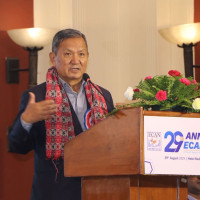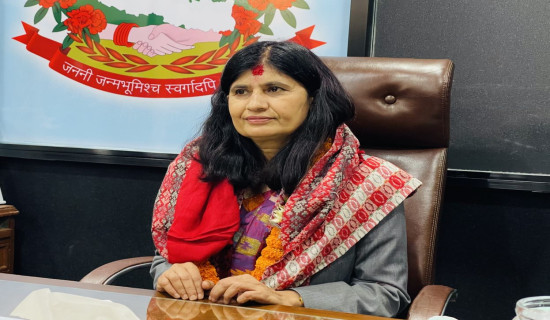- Saturday, 30 August 2025
Conflict Victims Run Out Of Patience
Nearly twenty years have passed since the end of the Maoist insurgency, yet for thousands of families, mostly women, the fight for justice never truly ended. They live in utter dilemma- on one hand, they still hope for the return of their missing loved ones and on the other, they are grief-stricken owing to the disappearances of their relatives. Nepal has made strides away from its patriarchal past, yet the inconsistencies remain, particularly for those women from marginalised and intersectional backgrounds.
During the decade-long Maoist insurgency, over 17,000 people were killed and thousands were displaced, detained, tortured, raped, sexually assaulted and forcibly disappeared. On this International Day of the Victims of Enforced Disappearances that falls on Saturday (August 30), it is pertinent to remember not only those who disappeared, but also those, who lost parents and grew old waiting for the reappearance of their loved ones, mothers who never stopped searching for their offspring, wives who are living with agony and uncertainty and children having no clue of whereabouts of their parents. There is silence, loss and relentless search for the disappeared. They suffered the trauma of not knowing what happened to their loved ones, even years later.
Repercussions
The signing of the Comprehensive Peace Accord (CPA) in 2006 was supposed to formally end the armed conflict. Under international law, disappearance is a continuing crime until the truth is known and justice delivered. After the conflict period, many families, particularly women, faced severe repercussions. The loss of male breadwinners suddenly compelled women to fend for themselves and feed their families. Many, previously dependent on their husbands, learned to sustain their families through hard work. They had to work for low pay. Along with these struggles, they have a constant, unanswered plea to the government to know the truth about their missing loved ones.
Nepal is a signatory to the International Convention for the Protection of All Persons from Enforced Disappearance and has pledged adherence to multiple human rights treaties. Yet there is a pressing question that remains unanswered: Are these rights truly being implemented? Or are they just confined to papers? International commitments have made little change to their daily reality. The 2023 report on the Impact of Enforced Disappearance on Women in Nepal, prepared by the Human Rights and Justice Centre, shows how the armed conflict devastated women. They are living with a deep scar in their life. The legal recognition of the term “disappearance” of their relatives has hardly helped the victims overcome their economic, social, psychological, and physical trauma.
Many women have been forced to declare their husbands dead to claim inheritance or reparations falsely. The state offers families of the disappeared a meagre Rs. 25,000 and Rs. 100,000 for families of the deceased. This disparity tempted many women to announce that their husbands perished in the conflict without confirming whether they were alive. They are/were doing so to sustain their families. This sounds perverse incentive that only fuels agony and impels women to lose hope and erase their memories of loved ones.
A woman’s striking testimony from the very report discloses how she was suggested to get an allowance by declaring herself as a single woman. She shares how sad she was when doing so, as she has not yet performed the final rites for her husband. She does not know his whereabouts but she has to accept a death certificate and allowances.
Faced with an economic burden, many women are trapped in financial desperation and moral anguish. While some security personnel acted with integrity during the conflict, accountability cannot be selective. What victims seek is not generalization, but the truth. In 2015, the Truth and Reconciliation Commission (TRC) and the Commission of Investigation on Enforced Disappeared Persons (CIEDP) were established to ensure transitional justice. Dispute over the appointment of their office-bearers and their limited mandate virtually turned them dysfunctional.
Amendment
In August 2024, the parliament passed the long-delayed bill to amend the Enforced Disappearances Enquiry, Truth and Reconciliation Commission Act. It gave hope to the conflict victims but the new appointments to the two separate bodies have been dragged into controversy, much to the chagrin of the victims. The victims have also criticised the amendment as it leaves loopholes that could allow amnesty for grave, heinous crimes and falls short of international standards.
The victims will get real relief only when they are no longer forced to trade truth for their survival. It is a stark reminder that power without accountability is hollow. The systemic failure of our transitional justice mechanisms, like the TRC and the CIEDP, has once again come to the fore. On this day of remembrance, the least we owe them is the dignity of not being asked to choose.
(Thapa is a law student at Kathmandu School of Law.)
















